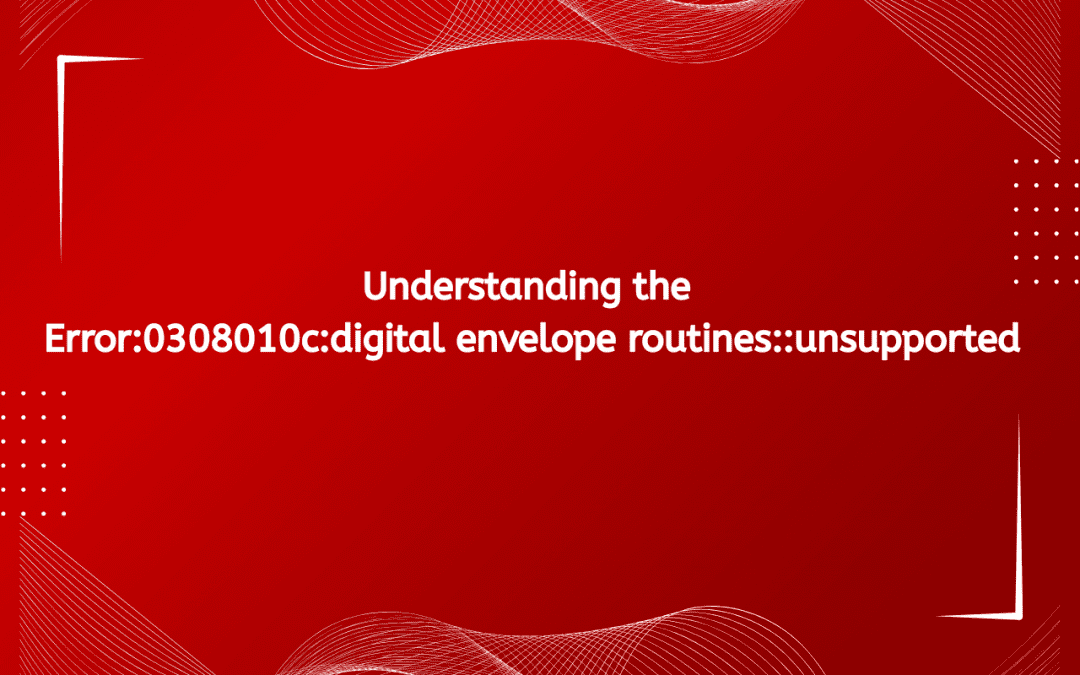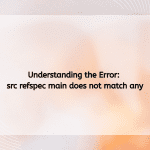In the realm of software development and cryptography, encountering errors can be a frustrating yet enlightening experience. One such error that has puzzled many developers is the Error:0308010c:digital envelope routines::unsupported. This error typically arises in environments that utilize the OpenSSL library for cryptographic operations. In this article, we will delve into the intricacies of this error, exploring its causes, implications, and practical solutions to help you navigate these challenges effectively.
What is OpenSSL?
Before diving into the specifics of the error, it’s essential to understand OpenSSL and its importance in cryptography.
Overview of OpenSSL

OpenSSL is an open-source toolkit that implements the Secure Sockets Layer (SSL) and the Transport Layer Security (TLS) protocols. It provides robust cryptographic functionalities, including:
- Encryption/Decryption: Ensuring data confidentiality.
- Digital Signatures: Authenticating data integrity and origin.
- Certificate Management: Handling public key infrastructure (PKI).
Given its widespread use, any errors related to OpenSSL can have significant implications on applications relying on secure communications.
Understanding the Error Code
The error message Error:0308010c:digital envelope routines::unsupported gives us a clue about its origin and nature.
Breakdown of the Error Code
- 0308010c: This portion of the error code indicates the specific function or routine within OpenSSL that has encountered an issue.
- digital envelope routines: This refers to a set of functions in OpenSSL that handle encryption and decryption processes, often involving symmetric encryption algorithms.
- unsupported: This indicates that the operation being attempted is not supported by the current configuration or context.
Common Causes of the Error
Understanding the root causes of the error is crucial for effective troubleshooting. Here are some common scenarios that can lead to this error:
1. Incompatible OpenSSL Version
One of the most frequent causes of this error is the use of an incompatible version of OpenSSL. Changes and deprecations in newer versions can lead to functionalities that are no longer supported.
2. Incorrect Cipher Selection
When attempting to encrypt or decrypt data, selecting an unsupported cipher can trigger this error. Each OpenSSL version supports a specific set of ciphers, and using one that is not included can lead to failure.
3. Misconfigured Node.js Environment
For developers working in a Node.js environment, this error may arise from misconfigurations in the runtime environment, particularly related to the OpenSSL settings.
4. Library Conflicts
Conflicts between different libraries or dependencies that utilize OpenSSL can also result in this error. For example, if two libraries require different versions of OpenSSL, it may cause operational issues.
Implications of the Error
Encountering Error:0308010c:digital envelope routines::unsupported can have several implications for software development and deployment:
1. Development Delays
Errors in cryptographic routines can halt development processes, requiring significant time and effort to diagnose and resolve, thus delaying project timelines.
2. Security Risks
If the error arises from an unsupported cryptographic operation, it could expose vulnerabilities in the application, potentially leading to security breaches.
3. User Experience
For applications that perform cryptographic operations, encountering this error can lead to poor user experience, as users may be unable to access essential features.
Diagnosing the Error
To effectively address the Error:0308010c:digital envelope routines::unsupported, it’s crucial to follow a systematic approach to diagnosis:
Step 1: Check OpenSSL Version
Begin by verifying the version of OpenSSL being used. This can typically be done by running the following command in your terminal:
openssl version
Ensure that you are using a version compatible with your application’s requirements.
Step 2: Review Cipher Support
Next, check the list of supported ciphers for your OpenSSL version. You can do this by executing:
openssl ciphers -v
Compare the list against the ciphers you are trying to use in your application to ensure compatibility.
Step 3: Inspect Code for Cipher Usage
Review the sections of your code where encryption or decryption occurs. Ensure that the ciphers specified in your code are supported by the OpenSSL version in use.
Step 4: Examine Configuration Settings
For Node.js applications, check the configuration settings related to OpenSSL. This includes environment variables that may affect how OpenSSL operates. For instance, ensure that the NODE_OPTIONS environment variable does not contain flags that might disable certain functionalities.
Step 5: Check for Dependency Conflicts
If your application relies on multiple libraries, check for potential conflicts. Ensure that all libraries are compatible with the OpenSSL version you are using.
Solutions to Resolve the Error
Once you have diagnosed the potential causes of the error, you can implement various solutions to resolve it.
1. Upgrade or Downgrade OpenSSL
If you determine that the version of OpenSSL is incompatible with your application, consider upgrading to a newer version that supports the required ciphers or downgrading to an earlier version known to work.
2. Change Cipher Selection
If the cipher you are attempting to use is unsupported, modify your code to utilize a supported cipher. This may involve updating the encryption logic in your application.
3. Adjust Node.js Configuration
For Node.js applications, you can adjust the configuration settings to ensure proper functionality with OpenSSL. For instance, you can set environment variables to specify the desired OpenSSL configuration:
export NODE_OPTIONS=--openssl-legacy-provider
This command enables legacy providers, potentially resolving compatibility issues.
4. Update Dependencies
Ensure that all libraries and dependencies in your project are up to date. This helps avoid conflicts and ensures that you are using the latest features and fixes.
5. Review Documentation
Consult the official OpenSSL documentation for guidance on supported features, best practices, and troubleshooting tips. The documentation can provide insights into the specific routines and ciphers available for your version.
Best Practices for Handling Cryptographic Operations
To minimize the risk of encountering errors like Error:0308010c:digital envelope routines::unsupported, consider the following best practices:
1. Stay Informed About OpenSSL Changes
Keep abreast of updates and changes to OpenSSL, especially if your application relies heavily on cryptographic functions. This includes following release notes and understanding deprecations.
2. Implement Robust Error Handling
Incorporate robust error handling in your code to gracefully manage cryptographic errors. This can improve user experience and provide clear feedback for troubleshooting.
3. Conduct Regular Security Audits
Regularly audit your application for security vulnerabilities, particularly in areas involving cryptography. This proactive approach can help identify potential issues before they become critical.
4. Use Secure Coding Practices
Adhere to secure coding practices when implementing cryptographic functions. This includes validating inputs, avoiding hard-coded secrets, and employing secure key management techniques.
5. Test Thoroughly
Conduct thorough testing of cryptographic functionalities in various environments. This includes unit tests, integration tests, and performance testing to ensure that all components function as expected.
Conclusion
The Error:0308010c:digital envelope routines::unsupported is a significant error that can disrupt cryptographic operations within applications utilizing OpenSSL. By understanding the underlying causes, implications, and solutions, developers can effectively navigate this challenge.
In today’s digital landscape, where security is paramount, ensuring the integrity and reliability of cryptographic operations is essential. By following best practices and staying informed about developments in OpenSSL, developers can enhance their applications’ robustness and security.
As the technology landscape continues to evolve, being equipped to handle cryptographic errors will remain a critical skill for developers. Embrace the complexities of cryptography, and leverage the power of OpenSSL to build secure and resilient applications.

Hello everyone! We’re Galussothemes content team, we love to write new blogs for WordPress Joomla! and other tech niches everyday. We’re talented young people who hold a strong passion for website development, designing, and marketing. Feel free to leave your comment if you have any issues or questions with our blogs.












